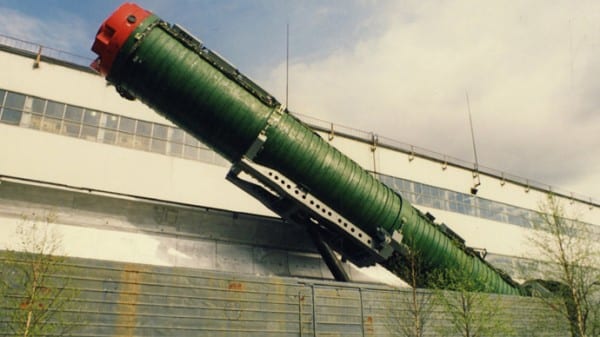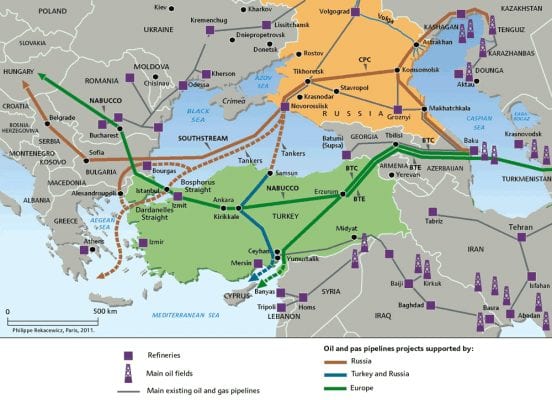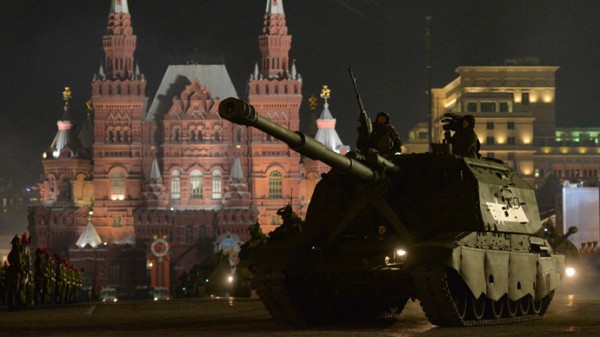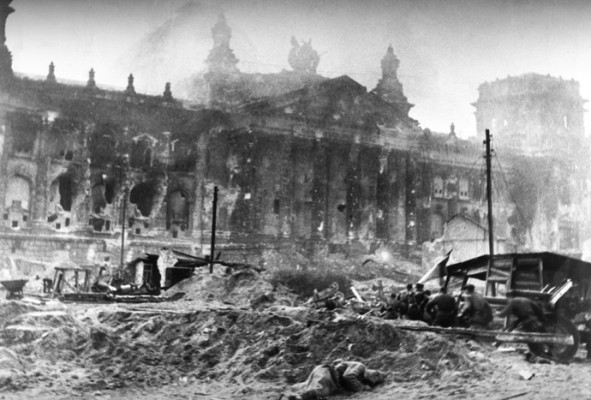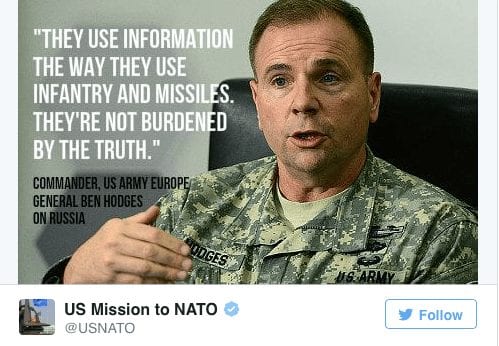We restarted the Cold War: The real story about the NATO buildup that the New York Times won’t tell you
PATRICK L. SMITH, SALON
RESPECTABLE VOICES IN THE MAINSTREAM MEDIA ARE BEGINNING TO DEFECT—A GREAT SIGN, EVEN IF IT MAY COME MUCH TOO LATE TO AVOID THE CATASTROPHE AHEAD
“Our leaders and media push time-worn nonsense about American innocence, while taking aggressive moves. Look out…”
Vladimir Putin, U.S. Secretary of Defense Ashton Carter (Credit: Reuters/RIA Novosti/Jonathan Ernst/Photo montage by Salon)
[dropcap]H[/dropcap]ave you picked up on the new trope du jour? We are all encouraged to bask in our innocence as we lament the advent of a new Cold War. The thought has been in the wind for more than a year, of course, at least among some of us. But we witness a significant turn, and I hope this same some of us are paying attention.
As of this week, leaders who know nothing about leading, thinkers who do not think and opinion-shaping poseurs such as Tom Friedman are confident enough in their case to sally forth with it: The Cold War returns, the Russians have restarted it and we must do the right thing—the right thing being to bring NATO troops and materiel up to Russia’s borders, pandering to the paranoia of the former Soviet satellites as if they alone have access to some truth not available to the rest of us.
James Stavridis, the former admiral and NATO commander, quoted in Wednesday’s New York Times: “I don’t think we’re in the Cold War again—yet. I can kind of see it from here.”
I can kind of see it, too, Admiral, and cannot be surprised: NATO has missed the Cold War since the Wall came down and the Pentagon’s creature in Europe commenced a quarter-century of wandering in search of useful enemies. At last, the very best of them is back.
The inimitable (thank goodness) Tom Friedman on the same day’s opinion page: “This time it seems like the Cold War without the fun—that is, without James Bond, Smersh, ‘Get Smart’ Agent 86’s shoe phone,” and so on.
Leave it to Tom to recall the single most consequentially corrosive period in American history by way of its infantile frivolities. He is paid, after all, to make sure Americans understand events cartoonishly rather than as historical phenomena with chronology, causality and responsibility attaching to them.
You have here a classic one-two. Stavridis’ successors in the military get on with the business of aggressing abroad and trapping Russia in a frame-up J. Edgar Hoover would admire, while Friedman buries us in marshmallow fluff sandwiches.
A couple of columns back I wondered aloud as to what all the talk of renewed Russian aggression, begun in mid-April, was all about. It certainly had nothing to do with Russian aggression for the simple reason there was none. If you saw any, please tell us all about it in the comment box.
A couple of columns earlier I questioned why John Kerry met Vladimir Putin and Sergei Lavrov, his foreign minister, in Sochi. Altogether weirdly, the secretary of state suddenly appeared to make common cause with the Russian president.
My worst predictions are now realities. We have just been subjected to a tried-and-sometimes-true campaign preparing us for a Cold War reprise—begun, like the original, by spooks and Pentagon planners ever eager to escalate unnecessary tensions in the direction of unnecessary conflict.
Think with history, readers. We are now back in the mid-1950s by my reckoning, when the template at work today was perfected in places such as Guatemala. The Dulles brothers double-handedly transformed Jacobo Árbenz, offspring of a Swiss druggist and Guatemala’s second properly elected president, into an agent of “Communist aggression,” as the Times helpfully described him at the time. Árbenz was deposed in 1954, of course, and most Americans were obediently relieved that another “threat” had been countered. (I have always loved the purely American thought of an aggressive Guatemala.)
On through the decades, from Ho to Lumumba to Allende to the Sandinistas—every single case falsely cast as a Moscow-inspired challenge to the “free world,” every case in truth reflecting America’s ambition to global dominance. There is a golden rule at work here, so do not miss it: Americans never act but in response to a threat to human freedom originating among the mal-intended elsewhere.
Any good historian—and stop being so negative, you find good ones here and there—will tell you that the golden rule has applied without exception since the 18th century. It applied to the Mexicans in the 1840s, the Spanish in the 1890s, and countless times during the century we call American.
Even now, the golden rule is inscribed in any American history text you may pick up. It is integral to Americans’ consciousness of themselves. And in consequence it is near to impossible for most of us to grasp our role in events as they unfold before our eyes, never mind our true place in history.
“There is a golden rule at work here, so do not miss it: Americans never act but in response to a threat to human freedom originating among the mal-intended elsewhere…”
So long as the rule applies, all notions of causality and responsibility are erased from the story. This reality is very close to the root of the American crisis, if you accept the thought that we are amid one.
I view the marked deterioration of the West’s relations with Russia since April in precisely this historically informed light. We have entered upon a new Cold War, all right, and its similarity to the last one lies in one aspect more important than any other: Washington instigated this one just as Truman set the first in motion when he armed the Greek monarchy—fascist by his own ambassador’s description—against a popular revolt in 1947.
[dropcap]Y[/dropcap]ou would think it something close to a magician’s trickery to conduct a century and more’s worth of coups, political subterfuge and military interventions and keep Americans convinced that all done in their names is done in the name of good. But we live through a case in point. We now witness an aggressive military advance toward Russia’s borders on a nearly astonishing scale, yet very few Americans are able to see it for what it is.
Such is the power of our golden rule. [Faithfully implemented by the empire’s Ministry of Truth, the “free press.” —Eds.]
The theme of new Russian aggression sounded over the past couple of months reeked of orchestration from the first, as suggested in this space when it was first sounded. It was too consistent in language, tone and implication, whether it came from the Pentagon, NATO or Times news reports—which are, naturally, based on Pentagon and NATO sources.
Anything counted: Russia’s military exercises within its own borders were aggressive. Russian air defense systems on its borders were aggressive. Russia’s military presence in Kaliningrad, Russian territory lying between Lithuania and Poland, was an aggressive threat.
The caker came 10 days ago, when Putin promised his generals 40 new intercontinental ballistic missiles. Aggressive times 10, we heard over and over. “Loose rhetoric” was the incessantly repeated phrase.
In this connection I loved Ashton Carter in an exclusive interview on CBS Tuesday morning. Announcing NATO’s new plans for deployments in Eastern Europe and the Baltics, the defense secretary cited Putin’s “loose rhetoric.” The correspondent must have lost the playbook and had the temerity to ask him to explain. Whereupon the wrong-footed Carter mumbled, “Well, it’s… it’s… it’s loose rhetoric, that’s what it is.”
Got it, Ash. Loose rhetoric.
Does the secretary mind if we spend a few minutes in the forbidden kingdom known as historical reality?
Putin has not uttered a syllable of rhetoric—no need of it—since the Bush II White House floored him with its 2002 announcement that it would unilaterally abandon Nixon’s 1972 Anti-Ballistic Missile Treaty. “This, in fact, pushes us to a new round of the arms race, because it changes the global security system,” the Russian leader said subsequently. Whereupon Russia set about rebuilding its greatly reduced nuclear arsenal, of which the 40 new ICBMs are an exceedingly small addition.
There are no secrets here—only chronology and causality. In the context, I view the 40 new missiles as a very measured message—and of little consequence in themselves—in reply to the immodest lunge into frontline nations Carter disclosed in Estonia this week.
Where did President Obama get the idea to name this guy to head Defense? He outdoes Rumsfeld in certain respects. Not only is he deploying weapons and rotating troops in and out of six of NATO’s easterly members—the three Baltics, Poland, Bulgaria and Romania. He now advances a number of bluntly escalating nuclear “options.”
Putin’s 40 warheads are squirrel guns next to Carter’s proposals. The new sec def is talking about an offensive nuclear curtain across Europe, a “counterforce” capable of hitting Russian military installations and “countervailing strike capabilities”—pre-emptively deployed nuclear missiles that include Russian cities among their targets. (Thanks to Pepe Escobar of Asia Times for his analysis of Carter’s “Pentagonese.”)
I should remind readers at this point, lest you forget, that we American are the aggressed upon, not the aggressors.
One news report can be singled out here as the celebratory herald of the newly unveiled stance. This is the previously quoted piece in Wednesday’s Times, which appeared under the headline, “NATO refocuses on the Kremlin, Its Original Foe.” Read it here, a real lab specimen, no breach of the golden rule anywhere in its several thousand words.
I needed a minute to get past the “refocuses” in the headline, with its thought that after many years away NATO must now unexpectedly return to the Cold War scene. Preposterous. How many members have been recruited eastward since the Wall came down? I count 12, 10 of which were Warsaw Pact nations. (Slovenia and Croatia, the other two, emerged from the destruction of Yugoslavia.)
Busy time advancing in the direction of the “original foe,” one has to say.
What follows the head is an account of new training exercises and dummy B-52 bombing runs—“all just 180 miles from the Russian border,” our correspondents report effervescently. This is wound around an exceedingly well-carved account of European views of this new turn backward. The latter is meant to veil ambiguity and reluctance that run wide and deep among many NATO members while making the enthusiasm found in former Soviet satellites appear to speak for the majority.
Fraudulent, top to bottom. One, European resistance to this latest NATO advance is now a matter of record. Recent surveys by organizations such as Pew indicate that among West European members the thought of coming to the aid of any newer member may be rejected by a majority.
Yes, we read, there are divisions within the European camp. But these are put down as the consequence of Russia’s campaign to sow disunity in NATO. I had to read that bit twice—and not only because it was reported twice in the same piece. I imagine a lot of Europeans are thinking this assertion over carefully, and not with smiling faces.
Two, East European army officers and civilian officials simply cannot be taken as authoritative judges of Russia and its intentions. This is flatly illogical, and as the Times habitually makes use of them as such I take it to be purposeful trickery to skew Americans’ understanding of European views of NATO.

Zbigniew Brzezinski: Polish aristocrat, russophobe and visceral anticommunist, he’s easily one of the most malignant figures in recent world history.
As earlier noted, I ascribe a certain paranoia to the Poles, the Balts and others formerly in the Soviet orbit. For obvious reasons this sentiment is understandable. But that does not make the argument that they are rational analysts. It makes the opposite argument: They may be understandably paranoid, and have a lot of bad history behind them, but paranoids are not to be taken as sound sources of analysis. Zbigniew Brzezinski is our up-close Exhibit A.
There is craft and there is wile, and these correspondents are well on the wily side in their use of sources. To represent the American view they resort to the usual Times scam: a single-source story dressed up as a multi-source story. Everyone quoted is either Pentagon, NATO or formerly one or the other. These people all get dressed in the same locker room every morning, let’s say, given they all say exactly the same thing.
(Memo to the Times: A multi-source story means a story representing multiple perspectives.)
On the European side, the mirror image: No one from Western Europe is quoted. Everyone cited is from one or another of the newly accessed member states, most being either military officers with fingers on triggers or defense ministry officials.
It skews the analysis to the point of implausibility. These people are all preparing for a Russian invasion of the Baltics or Poland, but there is no shred of evidence Moscow is within a million miles of any such planning. Evidence of Russia’s desire to calm this circus down is mountainous—and for precisely this reason ignored.
A couple of loose ends remain to be tied up at this juncture. The E.U. just renewed its sanctions regime against Russia for an additional six months. Why? There had been considerable resistance to this only a matter of weeks ago.
That visit Kerry paid to Sochi. Why did he make it, if all we see unfolding now was already on the story board, as surely it was at the time of Kerry’s curious travels?
These questions are best answered together, to the extent we have comprehensive answers. In my view a certain bargain has in all likelihood been struck.
Prior to Sochi, it was well known that Washington’s overplayed hand in Ukraine, especially its efforts to undermine the Minsk II ceasefire, had begun to threaten a trans-Atlantic breach. I have since had it from good sources in Europe and Washington that the Obama administration is disappointed, if not worse, with the Poroshenko government in Kiev. It does not take much to be a puppet, but they do not seem capable of managing even that.
Kerry went to Sochi not to launch any new initiative with Putin and Lavrov, as I had too hopefully suggested, but simply to assuage Chancellor Merkel and other disgusted Europeans. Hence Victoria Nuland’s clumsily calculated assertions, noted in this space at the time, that Minsk II was the key to a solution in Ukraine.
Kerry’s bargain, in my view, was that if things did not improve post-Sochi, the American option would go forward. And since Sochi we have had inertia in Kiev and the drum beating night and day as to Russian aggression. In effect, NATO and Washington conspired to make sure there would be no post-Sochi progress.
The American option, to finish the thought, now lies before us.
So does the curtain rise on the Cold War revival much of Washington has spoiled for since Putin proved other than the Yeltsin-like client American strategists had initially taken him to be.

Ashton Carter: If he’s lying through his teeth (which is likely) he’s a cold-blooded criminal that should be tried before an international tribunal with the greatest urgency. If he does NOT realize he’s using the Big Lie, he’s a moron, and scarcely the person to put at the helm of US defense. So which one is it? In both cases, as usual, the American people and the world, lose.
“We didn’t want to have this new challenge,” Defense Secretary Carter told Marines aboard a destroyer floating in the Baltic Sea. “But then all of the sudden here you have behavior by Russia, which is an effort to take the world backward in time. And we can’t allow that to happen.”
Sure thing, Ash. Taking the world backward. Thrust upon us. Got it. Golden rule always.
ABOUT THE AUTHOR
[box type=”bio”] Patrick Smith is the author of “Time No Longer: Americans After the American Century.” He was the International Herald Tribune’s bureau chief in Hong Kong and then Tokyo from 1985 to 1992. During this time he also wrote “Letter from Tokyo” for the New Yorker. He is the author of four previous books and has contributed frequently to the New York Times, the Nation, the Washington Quarterly, and other publications. Follow him on Twitter, @thefloutist.[/box]
[printfriendly]
Remember: All captions and pullquotes are furnished by the editors, NOT the author(s).
What is $5 a month to support one of the greatest publications on the Left?


